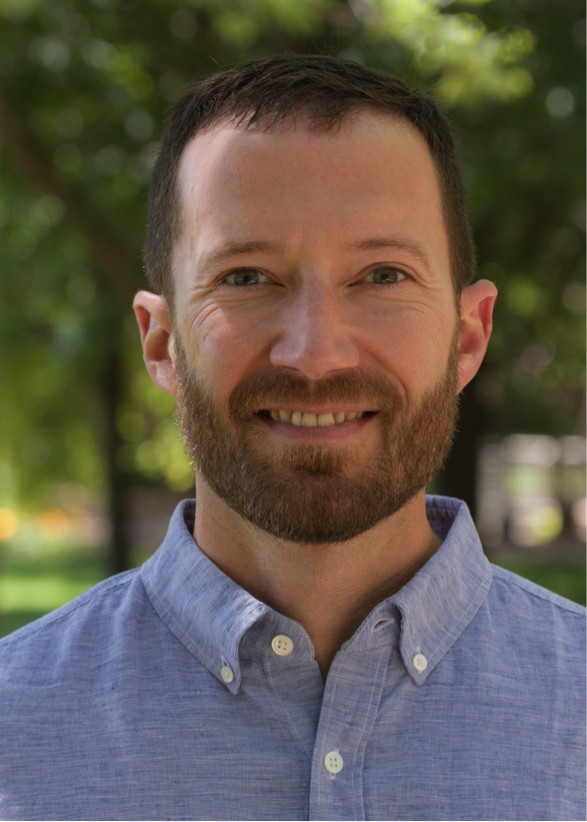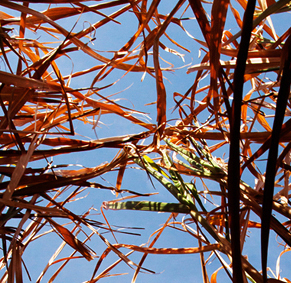Sustainability, Energy, & Environment
This grand challenge pathway explores how the societies of today can endure and prosper in the face of the global changes wrought by human activity. Can we produce enough energy to run modern civilization without risking dangerous climate change? Is there enough water and land to meet the challenge of growing global populations and industrializing economies? Solutions to these problems require an entwined understanding of science and society. The idea of sustainability—an ongoing project with a centuries-long history and no single definition—challenges us to think in terms of the planetary and eco-systemic as well as the human. The topic invites us to draw on the resources of a multi-disciplinary campus by crossing the boundaries of the arts, sciences, humanities, and social sciences.
Leadership
Executive Co-Chair, Trevor Birkenholtz
 Trevor Birkenholtz is associate professor of Geography and Geographic Information Science in the College of Liberal Arts and Sciences. He teaches on social-environmental sustainability, social power, and the politics of nature. In his research, he studies the political economy of access to and control over water resources, and the politics of science and technology, particularly around water conserving technologies. He has published in several leading journals such as Environment and Planning A, Geoforum, Society and Space, and Progress in Human Geography, among others. His current research projects focus on the social, political and ecological dynamics of water scarcity and irrigation systems in India and the US.
Trevor Birkenholtz is associate professor of Geography and Geographic Information Science in the College of Liberal Arts and Sciences. He teaches on social-environmental sustainability, social power, and the politics of nature. In his research, he studies the political economy of access to and control over water resources, and the politics of science and technology, particularly around water conserving technologies. He has published in several leading journals such as Environment and Planning A, Geoforum, Society and Space, and Progress in Human Geography, among others. His current research projects focus on the social, political and ecological dynamics of water scarcity and irrigation systems in India and the US.
Advisory Co-Chair, Tami Bond, Civil Engineering (ENG)
Advisory Co-Chair, Gillen D’Arcy Wood, English (LAS)
Advisory Co-Chair, Frances (Ming) Kuo, Natural Resources & Environmental Sciences (ACES)
Spring 2016 Grand Challenge Experience Courses (GCXs)
GCL 126 Interdisciplinary Pathways to Environmental Sustainability (Social Science) (multi-section first-year course)
GCL 126a IPESS: HUMANS AND ANIMALS (Social Science), Jane Desmond, TR 2-3:20PM
Through a critical engagement with scholarly writings and engaged participation in service learning activities in the local community, students will address the challenges of sustainability with a unique focus on human relations with non-human animals. Specifically, we will consider the cultural distinctions between animals considered "pets" and those considered "food" animals, both in U.S. and international contexts. Students will combine hands-on experiential learning at a local animal shelter with scholarly reflection, and will conduct original problem- solving research, which will be presented in a format designed to engage a wider community outside the classroom.
GCL 126b IPESS: URBAN SUSTAINABILITY (Social Science), Dustin Allred, MW 2-3:20PM
Students will investigate how we can create healthy, safe, fair, and equitable communities without compromising the earth's limited natural resources. The course explores the concept of sustainability by addressing the tensions that exist between our built environment (our regions, cities, and homes) and the natural systems that support all life on earth. Students will learn ways to resolve global, regional, and local environmental issues by better understanding how the choices we make - where and how we choose to live - impact urban sustainability. Specific topics include responses to climate destabilization, green infrastructure and urban systems, sustainable governance, green construction and urban design, water conservation, and energy production and consumption. Class activities will include visits to green buildings and projects around town. Students will develop a sustainability assessment of their hometown neighborhood.
GCL 126d IPESS: FROM FARM TO TABLE (Social Science), Ming Kuo, TR 2-3:20PM
In this course, we follow food "from farm to table” — from its origins to our plates. We will visit places and people all along the food chain, and learn first-hand where our food comes from and the steps it goes through to be transported, processed, and marketed to consumers. With the assistance of local experts, we examine the choices all along this journey and how those choices affect people and the environment. The semester concludes with a farm-to-table meal at which students will share their visions for a sustainable and healthy local food system with farmers and other local stakeholders.
GCL 129 Sustainable Design Across the Disciplines (Art) (multi-section first-year course)
GCL 129 SDADA: SUSTAINABLE DESIGN PRACTICES IN THE PUBLIC REALM (Art/Non-Western Cultures), Amita Sinha, TR 2-3:20PM
Through case work on Indian cities and field trips to local sites, students will learn about the challenges to achieving equitable, healthy and safe public spaces. Their hands-on work in sustainable design will focus on creating low cost, environment-friendly and technologically up-to-date structures that speak to the climate and cultural concerns of particular locations.
GCL 128 Fictions of Sustainability (Literature) (multi-section first-year course)
GCL 128a Fictions of Sustainability: FOOD, WATER, ENERGY (Literature), Jamie Jones, TR 2-3:20PM
“Sustainability” may seem like it’s all about science but as human beings, we learn to act on our environment through experiences that shape our relation to the natural world. In this class we think about how stories help us to explore these connections to food, water, and energy. Turning the campus into our lab and our readings into inspiration, we will source meals and embark on field trips. We will read memorable works of literature from different parts of the world including popular dystopic fiction ("cli-fi").
GCL 128b Fictions of Sustainability: FOOD, WATER, ENERGY (Literature), Gillen D’Arcy Wood, TR 12:30-2:20PM (Second 8-week.)
“Sustainability” may seem like it’s all about science but as human beings, we learn to act on our environment through experiences that shape our relation to the natural world. In this class we think about how stories help us to explore these connections to food, water, and energy. Turning the campus into our lab and our readings into inspiration, we will source meals and embark on field trips. We will read memorable works of literature from different parts of the world including popular dystopic fiction ("cli-fi").


